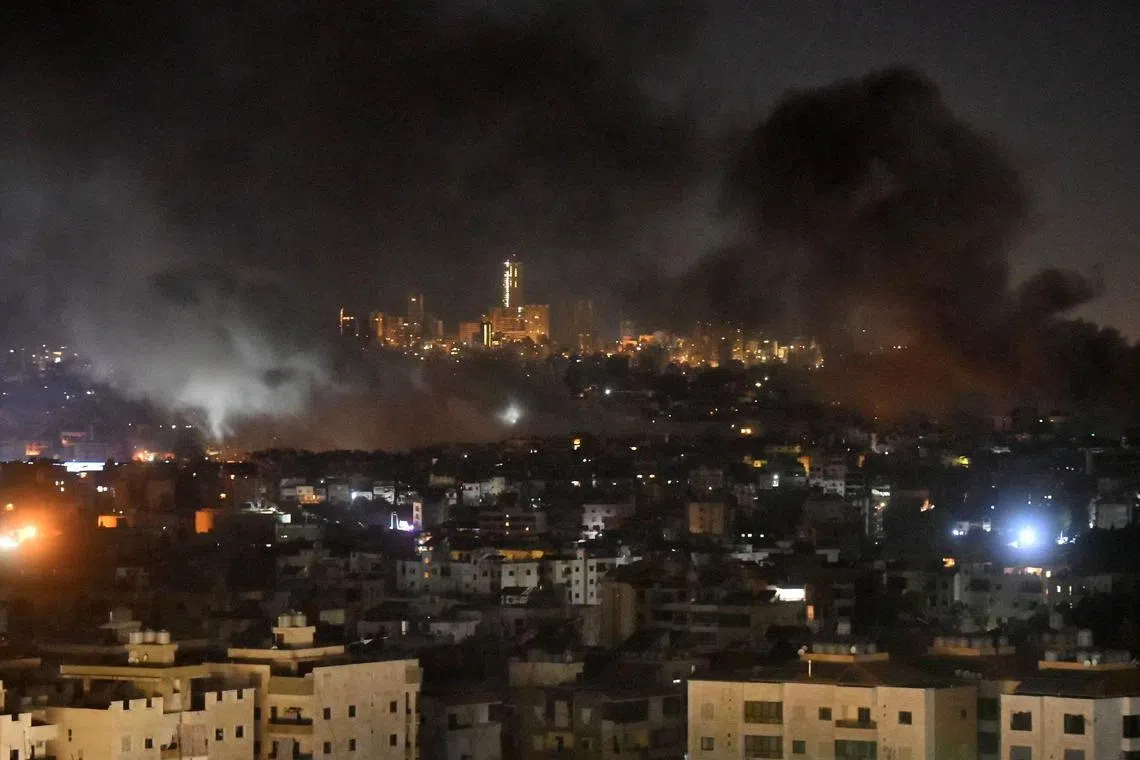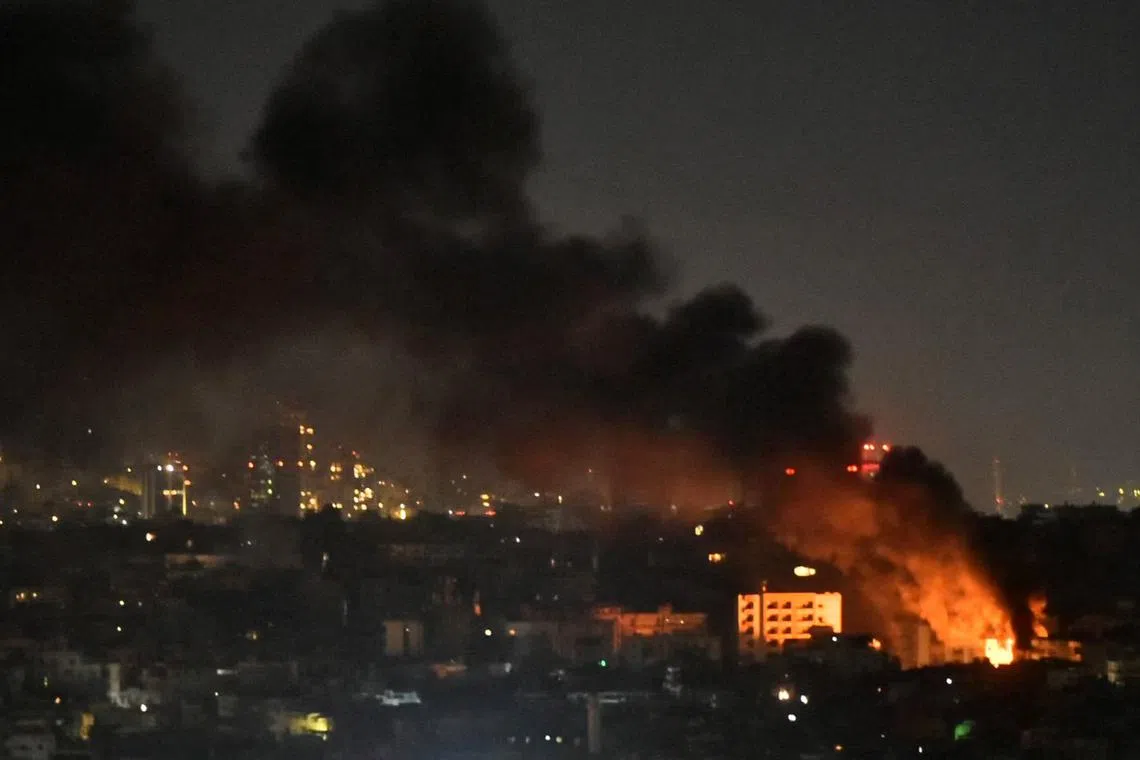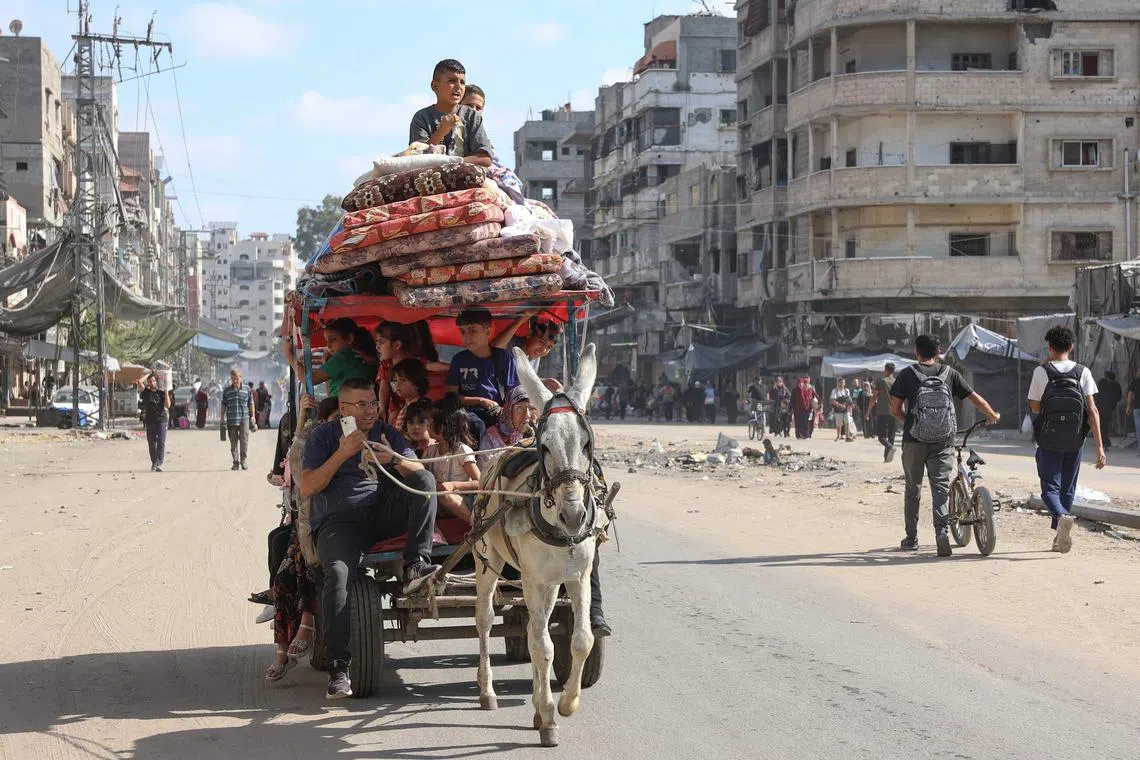Lebanese flee as blasts hit Beirut, Israel targets Hezbollah’s shadow bank
Sign up now: Get ST's newsletters delivered to your inbox

Smoke rising from areas targeted by an Israeli air strike in Lebanese capital Beirut’s southern suburbs late on Oct 20.
PHOTO: AFP
Follow topic:
JERUSALEM – Hundreds of Beirut residents fled their homes late on Oct 20, with multiple explosions heard across the Lebanese capital, while Israel struck branches across Lebanon of a financial institution linked to Hezbollah.
Reuters witnesses said they saw dense plumes of black smoke billowing after at least 10 blasts.
Eyewitnesses, who spoke on condition of anonymity, said a building located in the Chiyah neighbourhood in the southern suburbs of Beirut was reduced to rubble.
There were no casualties as the few people in the area had fled ahead of the explosion.
Panicked crowds clogged the streets and caused traffic jams in some parts of Beirut as they tried to get to neighbourhoods thought to be safer, witnesses said.
Israel attacked sites in Beirut, southern Lebanon and the Bekaa Valley targeting the branches of a banking system that it says is run by Hezbollah to finance its operations. No casualties were immediately reported.
The Israeli military said before its overnight attacks that it was targeting the Al-Qard Al-Hassan Association, an alternative to the Lebanese banking system which the US has said is used by Hezbollah to manage its finances.
The association has more than 30 branches across Lebanon including 15 in parts of central Beirut and its suburbs.
There was no immediate statement from the organisation, Hezbollah or the Lebanese government.
Asked by journalists whether the branches could be considered military targets, a senior Israeli intelligence official said: “The purpose of this strike is to target the ability of Hezbollah economic function both during the war but also afterwards to rebuild and to rearm... on the day after.”
Cross-border fighting between Israel and Hezbollah erupted a year ago when the group began launching rockets in support of Palestinian militant group Hamas in Gaza.
At the start of October, Israel launched a ground assault inside Lebanon
Israel has intensified its military campaigns both in Gaza and Lebanon, days after the killing of Hamas leader Yahya Sinwar
With the US presidential election approaching, officials, diplomats and other sources in the region say Israel is seeking through military operations to try to shield its borders and ensure its rivals cannot regroup.
Israeli forces are also preparing to retaliate for an Iranian missile barrage earlier in October, though Washington has pressed Israel not to strike Iranian energy facilities or nuclear sites.
Earlier on Oct 20, Israel said it hit Hezbollah’s intelligence headquarters and an underground weapons workshop in Beirut.
Fighter jets killed three Hezbollah commanders, the Israeli military said.
Hezbollah made no immediate comment on those strikes, but said it had fired missiles at Israeli forces in Lebanon and at a base in northern Israel.
A 41-year-old Israeli colonel was killed, and another officer was wounded in combat in northern Gaza on Oct 20, the Israeli military said.
Israel’s Channel 12 and public broadcaster Kan reported an explosive device had gone off under a tank.

Flames rising from Beirut’s suburban areas targeted by an Israeli air strike on Oct 20. Witnesses saw dense smoke billowing after at least 10 blasts.
PHOTO: AFP
Officials said rescuers were still recovering people from the rubble after an Israeli attack on the northern Gaza city of Beit Lahiya that left 87 people dead or missing on Oct 19, according to the health ministry – one of the highest death tolls for months from a single attack.
The strike came two weeks into a major assault around Jabalia, just south of Beit Lahiya, where Israel says its troops have been trying to root out remaining Hamas fighters.
Israel said the strike hit a Hamas target, questioning an earlier death toll of 73 released by the Hamas media office.
Hamas-led militants killed 1,200 people and took 250 hostages
Israel’s military response in Gaza has left more than 42,500 people dead and has made most of the enclave’s 2.3 million people homeless, Palestinian officials say.
Over the last year, Lebanese officials estimate that more than 2,400 people have been killed and over 1.2 million people displaced in Lebanon.
Fifty-nine people have been killed in northern Israel and the occupied Golan Heights over the same period, say the Israeli authorities. REUTERS

Palestinians fleeing areas north of Gaza City on Oct 12. Israel’s military response in Gaza has made most of the enclave’s 2.3 million people homeless, Palestinian officials say.
PHOTO: AFP

